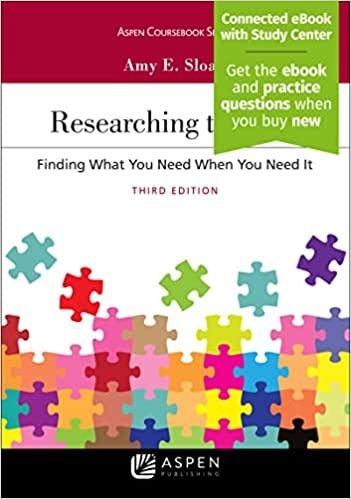Question
1. The least expensive form of discovery is called a deposition (True/False) 2. The party that responds to a civil or criminal complaint is called
1. The least expensive form of discovery is called a deposition (True/False)
2. The party that responds to a civil or criminal complaint is called the defense. (True/False)
3. A case proven to have standing is the same as a finding for the plaintiff. (True/False)
4. When there are a large number of plaintiffs, several lead plaintiffs can form a class in a class action lawsuit against the defendants. (True/False)
5. A peremptory challenge can be used to remove a juror based on gender. (True/False)
6. If a lawyer is dealing with an issue that takes him/her out of state to litigate a case, he/she can ask to be admitted temporarily by a court in that foreign state through a motion called:
A. for cause.
B. injunction.
C. request for admission.
D. pro hac vice.
E. open-door policy.
7. The procedure to give legal notice to a litigant that a court is exercising personal jurisdiction over that person is called:
A. Voir Dire
B. motion for answer.
C. service of process.
D. discovery.
E. peremptory.
8. After pleadings are filed, litigation moves into the _____ phase.
A. trial
B. discovery
C. appeal
D. spoliation
E. motions
9. The standard of proof in a criminal trial is:
A. presumption of innocence.
B. beyond a reasonable doubt.
C. affirmative defense.
D. preponderance of evidence.
E. in forma pauperis.
10. In the United States, lawyers undertake three years of graduate study resulting in the award of the:
A. Magister Juris degree.
B. Legum Doctor degree.
C. Juris Doctorate degree.
D. Scientiae Juridicae Doctor degree.
E. voir dire degree.
11. _____ refers to a sworn oral statement, in response to questions, given by a potential witness in a trial to the attorneys in the case.
A. Infraction
B. Deposition
C. Removal
D. Fabrication
E. Spoliation
12. A court acting without a direct request from a party is acting:
A. pro se.
B. bona fide.
C. res ipsa loquitur.
D. sua sponte.
E. pro hac vice.
13. A judicial order declaring a winner on the merits of a case is called a(n):
A. impeachment.
B. declaratory judgment.
C. injunction.
D. memorandum.
E. summary judgment.
14. State laws that set forth the procedure by which out-of-state defendants can be required to appear before a local court are called: A. provisions.
B. ordinances.
C. regulations.
D. long-arm statutes.
E. orders and proclamations.
15. An agreement made between opposing parties in litigation is called a(n):
A. impeachment.
B. deposition.
C. stipulation.
D. toll.
E. answer.
16 The statute of limitations for murder is:
A. one year.
B. five years.
C. ten years.
D. fifteen years.
E. exempted from time limits.
17. Failure to preserve and produce key evidence in litigation can lead to charges of:
A. spoliation.
B. novation.
C. dismissal.
D. abuse of process.
E. infraction.
18. The standard of proof in a civil trial is:
A. beyond a reasonable doubt.
B. presumption of innocence.
C. affirmative defense.
D. in forma pauperis.
E. preponderance of the evidence.
19. A jury's decision is called a(n): A. verdict.
B. opinion.
C. judgment.
D. execution.
E. exoneration.
20. The very first law of Congress signed by President Obama was the:
A. Employee Free Choice Act.
B. Health Care Reform Act.
C. Economic Stimulus Act.
D. Lilly Ledbetter Fair Pay Act.
E. Carbon Cap and Trade Act.
21. Which of the following does NOT justify a statute of limitations?
A. Witnesses get old or forget
B. Evidence is lost
C. Companies need to close their books on past liabilities
D. The accused is absconding
E. Witnesses move or cannot be located
22. Courts are legally required to pay _____ to jurors serving on jury duty.
A. a juror's ordinary pay
B. 50 percent of a juror's ordinary pay
C. a juror's living expenses
D. no specific amount
E. typically less than $20 per day, to cover food and transportation costs
23. The act of allowing third-party defendants to be joined in litigation is called:
A. interpleading.
B .interlocutory.
C. joinder.
D. unity.
E. pro se.
24. A motion for a judge to rule on a case based solely on the answer and A. complaint is called:
A. motion for expedited decision.
B. motion for judgment on the pleadings.
C. motion to dismiss.
D. motion for a directed verdict.
E. motion for summary judgment.
25. Personal jurisdiction requires litigants to have some form of _____ with the state where the case is filed. A. res judicata
B. voir dire
C. minimum contacts
D. writ of certiorari
E. sua sponte
26. Through _____, defendants can bring in other third-party defendants to answer a lawsuit.
27. A litigant who represents himself/herself without an attorney is known as a _____ litigant.
28. The loser in litigation cannot refile a civil lawsuit once it has been decided under the doctrine of ______.
29. In the _____, attorneys explain the facts of the case to the jury and indicate what witnesses they will be calling and what the witnesses will say.
30. Failure to respond to a complaint can result in a _____ judgment.
Step by Step Solution
There are 3 Steps involved in it
Step: 1

Get Instant Access to Expert-Tailored Solutions
See step-by-step solutions with expert insights and AI powered tools for academic success
Step: 2

Step: 3

Ace Your Homework with AI
Get the answers you need in no time with our AI-driven, step-by-step assistance
Get Started


